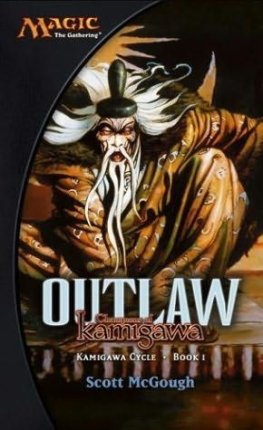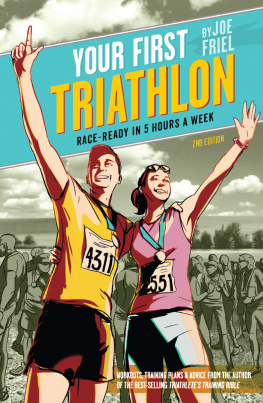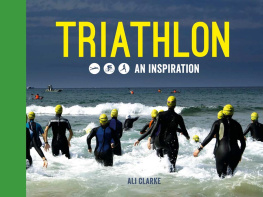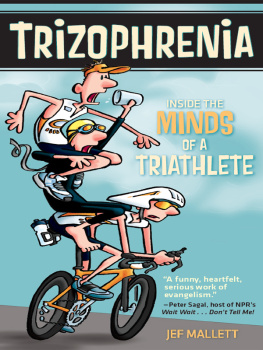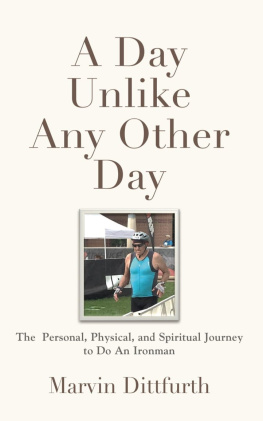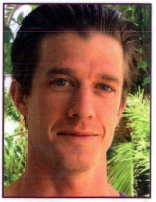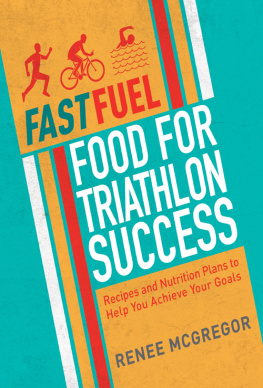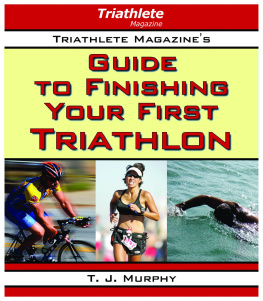Will McGough - Swim, Bike, Bonk: Confessions of a reluctant triathlete
Here you can read online Will McGough - Swim, Bike, Bonk: Confessions of a reluctant triathlete full text of the book (entire story) in english for free. Download pdf and epub, get meaning, cover and reviews about this ebook. year: 2019, publisher: Lyons Press, genre: Detective and thriller. Description of the work, (preface) as well as reviews are available. Best literature library LitArk.com created for fans of good reading and offers a wide selection of genres:
Romance novel
Science fiction
Adventure
Detective
Science
History
Home and family
Prose
Art
Politics
Computer
Non-fiction
Religion
Business
Children
Humor
Choose a favorite category and find really read worthwhile books. Enjoy immersion in the world of imagination, feel the emotions of the characters or learn something new for yourself, make an fascinating discovery.

- Book:Swim, Bike, Bonk: Confessions of a reluctant triathlete
- Author:
- Publisher:Lyons Press
- Genre:
- Year:2019
- Rating:5 / 5
- Favourites:Add to favourites
- Your mark:
- 100
- 1
- 2
- 3
- 4
- 5
Swim, Bike, Bonk: Confessions of a reluctant triathlete: summary, description and annotation
We offer to read an annotation, description, summary or preface (depends on what the author of the book "Swim, Bike, Bonk: Confessions of a reluctant triathlete" wrote himself). If you haven't found the necessary information about the book — write in the comments, we will try to find it.
Swim, Bike, Bonk: Confessions of a reluctant triathlete — read online for free the complete book (whole text) full work
Below is the text of the book, divided by pages. System saving the place of the last page read, allows you to conveniently read the book "Swim, Bike, Bonk: Confessions of a reluctant triathlete" online for free, without having to search again every time where you left off. Put a bookmark, and you can go to the page where you finished reading at any time.
Font size:
Interval:
Bookmark:
Will McGough is an award-winning international travel writer and the owner of Wake and Wander Media. He graduated from Virginia Tech a long time ago and has written for a variety of adventure and travel publications. He also guides trips and splits his time between Hawaii, Colorado, and the road.


An imprint of The Rowman & Littlefield Publishing Group, Inc.
4501 Forbes Blvd., Ste. 200
Lanham, MD 20706
www.rowman.com
Distributed by NATIONAL BOOK NETWORK
Copyright 2020 Will McGough
All rights reserved. No part of this book may be reproduced in any form or by any electronic or mechanical means, including information storage and retrieval systems, without written permission from the publisher, except by a reviewer who may quote passages in a review.
British Library Cataloguing in Publication Information available
Library of Congress Cataloging-in-Publication Data available
ISBN 978-1-4930-4162-6 (hardcover)
ISBN 978-1-4930-3639-4 (e-book)
 The paper used in this publication meets the minimum requirements of American National Standard for Information SciencesPermanence of Paper for Printed Library Materials, ANSI/NISO Z39.48-1992.
The paper used in this publication meets the minimum requirements of American National Standard for Information SciencesPermanence of Paper for Printed Library Materials, ANSI/NISO Z39.48-1992.
This book is an account of my experience as a participant at the 2017 Ironman Arizona and my experiences before, during, and after that event. The opinions and portrayals shared in this book are my own and are in no way affiliated with Ironman or the World Triathlon Corporation.
Some of the names in the book have been changed. In minor instances, events and interactions have been streamlined for the sake of storytelling. Overall, the major timeline remains true and intact, and all the accounts of the events, people, and places are genuine and my own.
Tempe Tourism granted me a media pass to compete in the 2017 Ironman Arizona. I have not been authorized, endorsed, sponsored, or licensed by, nor has content been reviewed or otherwise approved by, Tempe Tourism or the World Triathlon Corporation.
To my Mom and Dad for always encouraging me to be no one but me
By Gordon Haller, the first Ironman
Will McGough has written a very detailed account of how he prepared for and participated in his first and possibly only Ironman Triathlon. His story includes the effects of Ironman training on his life, work, and relationships, as well as on his mind and body. He provides a taste of the history of the race and musings on the early years for the creators of the race. From the descriptions, we gain that there is a marked difference in how he and many others prepare now compared with the way we, the fifteen original competitors, approached the first Ironman Triathlon back in 1978. This is true. Not only did we train differently, but also the race itself was completely different.
I first heard about the Ironman two and a half months before the race while I was on Oahu running in the Honolulu Marathon that December. I answered an ad in the newspaper and, because it was not a big thing at all, was swept up with fourteen other people on the organizing committee. Some of those names you might recognize: John Collins; Ian Emberson; John Dunbar. Together, throughout December and January, we created the framework for the Ironman leading up to the race on February 18, 1978.
Obviously, we didnt give ourselves much time to train specifically for the race, but we were all fitness enthusiasts, so we were in pretty good shape. In this way, Wills journey is probably more similar to our experiences back in 1978 than it is to todays journey, where people hire coaches and train twelve to eighteen months for a single event. But Will also had an advantage that we original athletes didnt: He had access to a lot of information on the Internet and social media about what others were doing to prepare for the race.
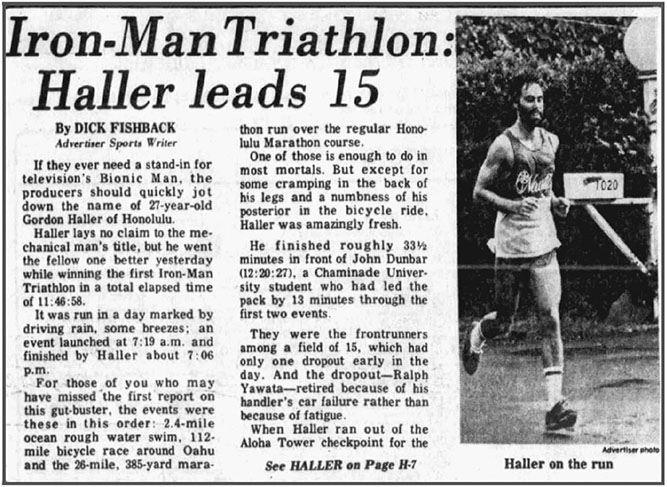
News clipping from the Honolulu Advertiser on Sunday, February 19, 1978, the day after the first Ironman, announcing Gordon Hallers victory. NEWSPAPERS.COM
We werent thinking much about that. To us, there was no hypeit was just a fun race. My coworkers became my support crew. One of them became my support crew chief and organized my team of six to help guide me through the day.
Current races call for participants to arrive in the dark to get numbers marked on their arms and legs, to check their bikes, turn in bags. There are a lot of cameras and interviews going on. Loud music playing, bright lights. Helicopters in the air. Thousands of people moving about, competitors, families, friends, TV crews, reporters, race officials, and crews.
The first race was much different. The gray morning on the beach at the Diamond Head end of Waikk brought a few dozen people who quietly milled about waiting for the word to be passed about how the day was expected to go. John Collins gave a short speech about the rules. The rules were simple: Swim 2.4 miles, ride 112 miles, run 26.2 miles and brag for the rest of your life.
It was very casual. Everyone had their own support crew (sometimes, that was only a single friend). Each had a paddler on a surfboard, as there were no buoys to guide us. Drafting wasnt illegal, but I dont think there was any opportunity to do so. I had two bikes and that was OK. We could accept help from anyone. There were no aid stations on the run or bike.
Of course, now there are very large orange and yellow buoys every 100 meters or so in most races. Kona has a cannon to start the race. Many Ironman races have wave starts due to the number of entrants, which now often top 2,500. There still are paddlers, but they are there for guiding and rescuing any and all. There are boats, jet skis, and scuba divers to ensure safety.
I dont remember if we had a starters pistol or if they just said Go. We went. Out to where our paddlers were. My paddler was eleven years old and a surfing veteran. He did a great job, as did all of the paddlers. The water was very calm and nobody got in anyones way, and I never saw anyone after the first turn. After all, 2.4 miles is a lot of open water with only fifteen people.
Transitions are perhaps the biggest difference between then and now. When we came out of the water, we walked up the beach to the Hale Koa military hotel, showered, and changed into dry clothes for the ride. I spent maybe 20 minutes at T1, though it wasnt called T1we didnt have a name for it. For T2, I jumped in the fountain at the Aloha Tower, changed into my dry running kit, did an interview with the newspaper, got a massage, drank a Coke, and started my run. Probably another fifteen or twenty minutes. This type of dillydallying would horrify competitors today, who consider transitions part of the race.
Will goes into a lot of graphic detail in his description of his bike training. For those not in the know, that may be too much information. But sooner or later all of us will have a similar experience regarding digestive disorders, some more so than others. His problems can hit anyone anytime. He tells us his thinking in his selection of fluids and nutrition. It is perhaps the most important part of race preparation. He nails it as his energy source, but something goes awry, so we get to see how he tries to solve that problem. As President Eisenhower once said, Plans are useless, but planning is indispensable. Will did a lot of planning.
Font size:
Interval:
Bookmark:
Similar books «Swim, Bike, Bonk: Confessions of a reluctant triathlete»
Look at similar books to Swim, Bike, Bonk: Confessions of a reluctant triathlete. We have selected literature similar in name and meaning in the hope of providing readers with more options to find new, interesting, not yet read works.
Discussion, reviews of the book Swim, Bike, Bonk: Confessions of a reluctant triathlete and just readers' own opinions. Leave your comments, write what you think about the work, its meaning or the main characters. Specify what exactly you liked and what you didn't like, and why you think so.

